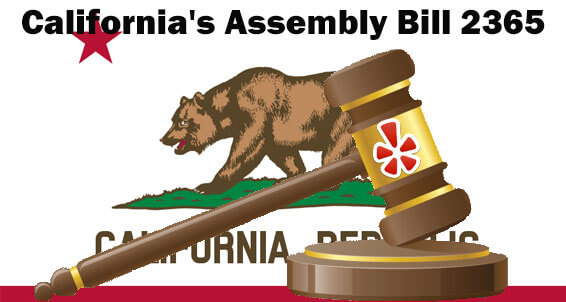How California’s Assembly Bill 2365 will Affect Negative Online Reviews
 In a potentially landmark decision for digital marketers as well as consumers, the California Assembly has affirmed the right of California consumers to post negative online reviews without fear of retribution. Unofficially dubbed the “Yelp Bill,” AB 2365 prohibits businesses from enforcing non-disparagement agreements which would penalize customers who subsequently post a negative online review about the business.
In a potentially landmark decision for digital marketers as well as consumers, the California Assembly has affirmed the right of California consumers to post negative online reviews without fear of retribution. Unofficially dubbed the “Yelp Bill,” AB 2365 prohibits businesses from enforcing non-disparagement agreements which would penalize customers who subsequently post a negative online review about the business.
The consumer protection bill is slated to take effect in 2015, and provides for an initial $2,500 fine levied against businesses who threaten customers with penalties for publishing negative reviews. Subsequent violations will earn the business a $5,000 fine; willful, intentional, or reckless actions taken by the business will trigger a $10,000 penalty.
While AB 2365 only applies to actions taken against California consumers, the legislative action is expected to strengthen the growing nationwide sentiment against companies who attempt to weaken or muzzle legitimate consumer complaints. The Consumer Review Freedom Act, a similar bill that would extend protection to consumers on a national level, is expected to be introduced soon in the U.S. House of Representatives.
What’s Really Behind the “Yelp Bill”
California’s action is seen as a response to the sometimes bewildering stance taken by some businesses that prefer to stifle legitimate customer complaints rather than improve the quality of their goods and services. By removing this muzzle from the voice of the public, the volume of legitimate negative reviews will undoubtedly increase.
- A Utah couple suffered devastating damage to their credit score when they posted a negative review about a purchase from KlearGear. Buried within the terms of sale on their purchase contract was a clause that provided for a $3,500 penalty if they ever wrote anything negative about the company. KlearGear offered to waive the assessment if the couple agreed to remove their negative review from the RipOff Report website, and filed a derogatory report with the credit bureaus when the couple declined to comply.
- A similar high-handed tactic appears to be standard operating procedure with the Union Street Guest House, an upscale hotel in Hudson, New York once owned by the Rockefeller and Vanderbilt families. Customers booking the facility for a wedding or other type of event do so on the hotel’s rather onerous terms: a $500 penalty will be deducted from any deposits made to the hotel for each negative review posted on any website by anyone in the guest’s party. After posting the anti-review policy, Union Street received a flurry of negative reviews that dropped the hotel’s Yelp rating to 1.5 stars.
How Should Businesses Respond to AB 2365?
In a nutshell, those companies that knowingly promote inferior products and services or provide mediocre customer service will eventually get exactly what they deserve: public humiliation and lost revenue from potential customers.
California’s AB 2365 bill should serve as a wake-up call to businesses to re-align their product offerings and customer service policies for maximum customer value and satisfaction. In addition, businesses are urged to regularly monitor their online reputation, respond quickly and professionally to customer problems and criticisms, and begin building a 5-star reputation by acquiring and marketing positive reviews.










